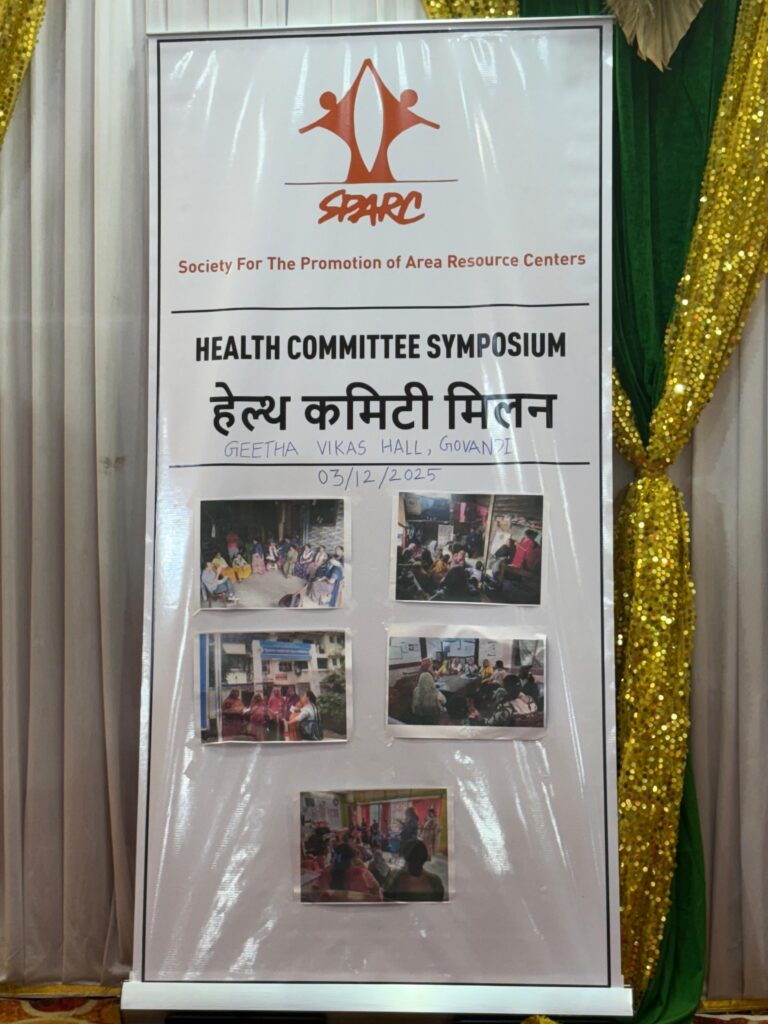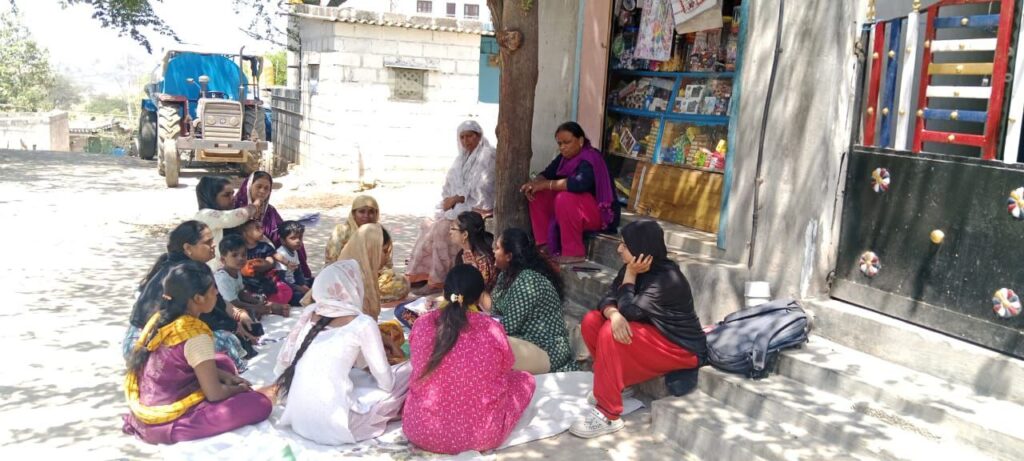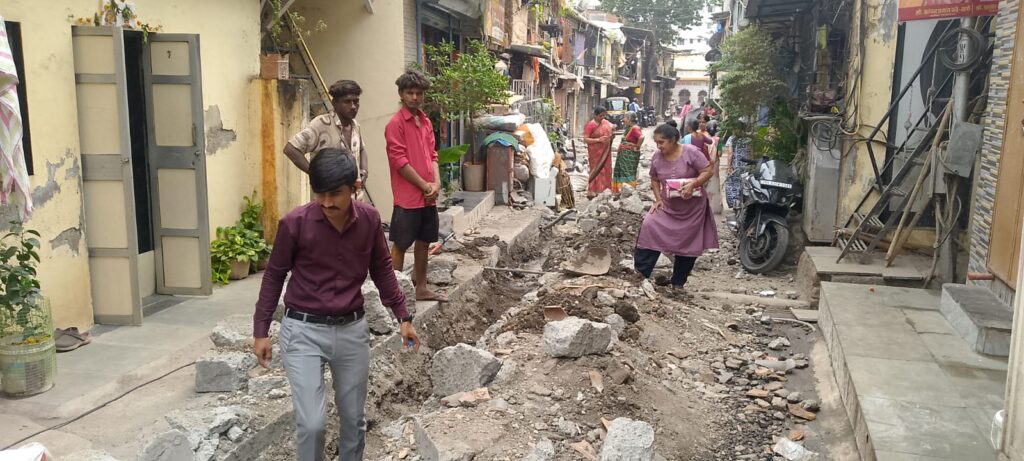Authors: Menaka MB, Shayari Nag, Sweta Dash, Jith JR- The George Institute for Global Health, India Mobilising for Care: A Bengaluru Mahila Aarogya Samiti’s Fight for an Aanganwadi Centre In the Mahila Aarogya Samiti (MAS) meetings in Pillaganahalli, the members –female residents of the slums – dedicate their time and energy to long conversationsaround how even the domestic problems are not solely personal and private. Theseconversations eventually culminate in underscoring the need for and the ways toconnect women’s domestic problems with the overall health and well-being of thecommunity. In one of the initial MAS meetings in May 2024, when asked about the problems they faced and what they would want to collectively work to address and solve, the topic of Aanganwadi centres emerged as a critical concern. “There are so many kids in our community, but we get no facilities from the Aanganwadi. Without the Aanganwadi centre, our kids are just roaming in the streets instead of learning and playing in an Aanganwadi,” said one of the members. Another member corroborated this feeling and added, “Even the nearest Aanganwadi centre is too far, so none of us uses it. Our children don’t get meals from there, and we never receive any important updates on time.” MAS Meeting at Pillaganahalli An Aanganwadi centre (AWC) is established under India’s Integrated Child Development Services (ICDS) scheme as a community-based solution for maternal and child health and welfare. It delivers essential health, nutrition, and early education services to children under 6 years, pregnant women, and nursing mothers. Additionally, AWCs are tasked with providing daily meals, growth monitoring, vaccinations, preschool education, and health counselling, directly combating malnutrition, infant mortality, and educational gaps. “Our children spend their days playing under the scorching sun, and we struggle just to keep them indoors. Without a safe place for them, we, women, cannot even stepout to work. But with an Aanganwadi centre around, we could have the option of leaving our children in good hands and focus on earning a living,” said one of the women. Others in the meeting further explained that with children at home, even daily household chores become difficult to manage, and their carework responsibilities increase in countless ways. Our team assured them that the MAS would address their concerns by gathering more information about establishing an Aanganwadi and providing updates at the next meeting. I dug further to know about the Aanganwadi system and discussed the matter with Venkatesh, my senior at the SIEDS, one of the partner organisations for the TGI-COMPLUS team. I learned that, behind every Aanganwadi, lies a carefully organised system. At the local level, an Aanganwadi Worker (AWW) is typically a local woman trained in childcare and health who runs daily operations like teaching preschoolers, distributing nutritional supplements, and tracking children's growth. She is assisted by an Aanganwadi Helper (AWH) who manages meals and cleanliness. Overseeing 20-25 centres each, a Supervisor conducts periodic checks, reviews records, and mentors the AWWs to ensure quality at the AWCs. At the district level, there exists a Child Development Project Officer (CDPO) who functions as the administrative and financial decision-maker to approve new centres, allocate resources, and steer policy implementation. Venkatesh happened to have contact with the CDPO for the Pillaganahalli area. He promised to check her availability, but also suggested that the women draft a formal request letter. The next MAS meeting was thereby dedicated to drafting this letter together with the women, detailing the challenges faced without an AWC and the potential benefits of establishing one. The draft was read aloud to the group, their feedback was noted and incorporated, and the letter was signed by the members to formalise the community’s appeal. We managed to get a meeting with the CDPO in October. Five women from the Pillaganahalli MAS accompanied me and two other representatives from SIEDS to this meeting that afternoon. We had to wait for a long time at their office. The women grew increasingly anxious, worrying about their children returning from school. When we finally met with the CDPO, one of the MAS members explained their situation and emphasised how having an AWC nearby would help children and their mothers. The CDPO seemed to acknowledge the concern, but she laid out the challenges: Setting up AWCs was no cakewalk. AWCs require government land for permanent operation under ICDS guidelines, and there was none available in that area. MAS members meeting the CDPO regarding the AWC in Pillaganahalli The only glimmer of hope, we thought, was the solution she proposed. If the community could identify a rentable location meeting the ICDS standards, her officewould inspect it, and the Government would cover the rent through ICDS funds, she assured us. We set out to find a space to set up an AWC for the women of this MAS. We also made a list of 65 children eligible for attending the soon-to-be established AWC. Filled with hope and determination, the next MAS meeting was dedicated to discussions about the requirements for an AWC. Soon after, the women identified five vacant rental houses in Pillaganahalli; they shortlisted two of these based on essential criteria such as adequate seating space for children, water supply, toilet facilities, and a secure compound. Community’s attempt to find vacant rental houses in Pillaganahalli We promptly informed the Department of Women and Child Development, which agreed to conduct an inspection. Eager to make a strong impression, the women even cleaned one of the houses themselves: dusting, sweeping, and mopping every corner. However, the owner of the selected house refused to rent it out after learning that the Government would provide him only ₹4,000 per month as rent with no advance payment. The women in the MAS meeting and the SIEDS representatives felt disappointed and frustrated due to this refusal, as did I. But, I felt we should keep trying. I accompanied another representative from SIEDS to meet an influential local leader who works closely with the area’s MLA. This man, despite his limited knowledge of vacant rental buildings, committed to





